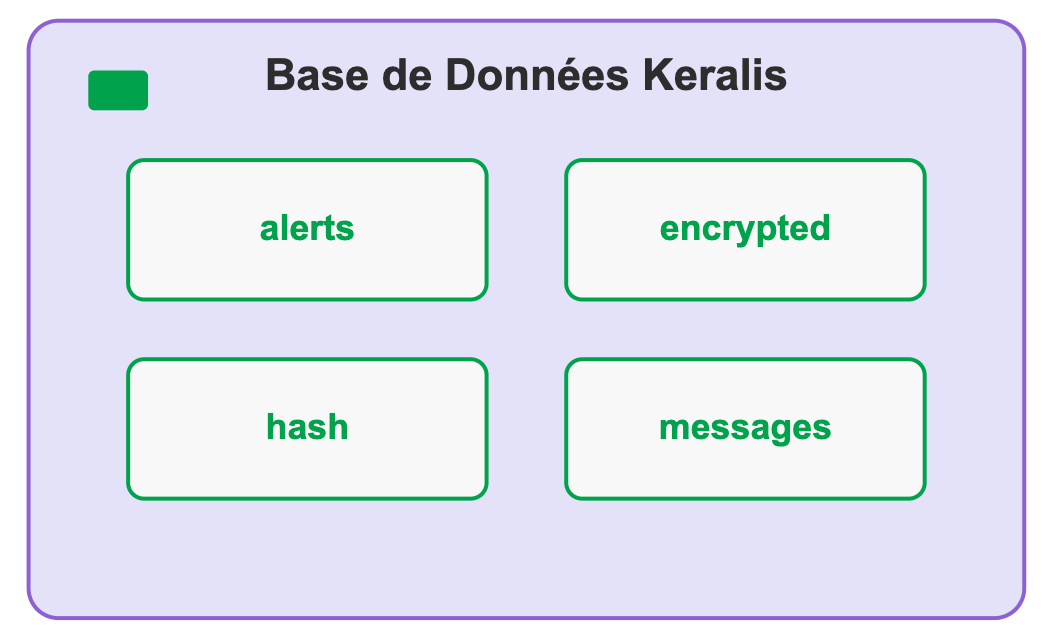Blockchain Server Installation
This section covers the installation and configuration of the blockchain server that verifies log integrity and records hashes on the Hedera blockchain.
Preparation
Start by creating the necessary folder structure:
mkdir -p /root/keralis
cd /root/keralis
git clone <repo_url> .
cd blockchain
Installing Dependencies
Install Node.js dependencies:
npm install
MongoDB Configuration
Ensure that MongoDB is installed and running:
# MongoDB installation (if necessary)
sudo apt update
sudo apt install -y mongodb-org
sudo systemctl start mongod
sudo systemctl enable mongod

MongoDB database architecture diagram
Configuration
Environment Variables
Create a .env file in the /root/keralis/blockchain/ folder:
cat > .env << EOL
# Hedera
MY_ACCOUNT_ID=<your_account_id>
MY_PRIVATE_KEY=<your_private_key>
MY_PUBLIC_KEY=<your_public_key>
# MongoDB
MONGODB_USER=<db_user>
MONGODB_PASSWORD=<db_password>
MONGODB_HOST=<db_host>
MONGODB_PORT=27017
MONGODB_DB_NAME=Blockchain
MONGODB_COLLECTION=messages
MONGODB_AUTH_SOURCE=admin
# Application
HASH_SERVER_URL=http://<client_ip>:3001
HASH_SERVER_API_KEY=<same_as_client>
CHECK_INTERVAL=900000
# Dashboard
DASHBOARD_PORT=3000
DASHBOARD_USER=<admin_user>
DASHBOARD_PASSWORD=<strong_password>
# Email
SMTP_HOST=<smtp_host>
SMTP_PORT=587
SMTP_SECURE=false
SMTP_USER=<email_user>
SMTP_PASS=<email_password>
ALERT_EMAIL_FROM=<sender_email>
ALERT_EMAIL_TO=<recipient_email>
EOL
PM2 Configuration
Create an ecosystem.config.js file to manage services with PM2:
cat > ecosystem.config.js << EOL
module.exports = {
apps: [{
name: 'blockchain-checker',
script: 'blockchain-integrity-checker.js',
watch: true,
env: {
NODE_ENV: 'production'
}
}, {
name: 'dashboard',
script: 'dashboard.js',
env: {
NODE_ENV: 'production'
}
}]
}
EOL
Starting Services
Start the services with PM2 and configure them to start automatically:
pm2 start ecosystem.config.js
pm2 save
pm2 startup
System Testing
Test the complete system:
node test-integrity-system.js
Dashboard Access
The dashboard should be accessible at the following address:
http://<blockchain_server_ip>:3000
Use the credentials defined in the .env file to log in.
Blockchain-api Server Installation
This section covers the installation and configuration of the client server that manages log files and calculates their hashes.
Preparation
Start by creating the necessary folder structure:
mkdir -p /root/keralis/logs
cd /root/keralis
git clone <repo_url> .
cd blockchain
Installing Dependencies
Install Node.js dependencies:
npm install
Configuration
Environment Variables
Create a .env file in the /root/keralis/blockchain/ folder:
cat > .env << EOL
HASH_SERVER_PORT=3001
HASH_SERVER_API_KEY=<generate_strong_key>
EOL
Use a command like openssl rand -hex 32 to generate a strong API key.
PM2 Configuration
Create an ecosystem.config.js file to manage the service with PM2:
cat > ecosystem.config.js << EOL
module.exports = {
apps: [{
name: 'hash-server',
script: 'client-hash-server.js',
watch: true,
env: {
NODE_ENV: 'production'
}
}]
}
EOL
Starting the Server
Start the server with PM2 and configure it to start automatically:
pm2 start ecosystem.config.js
pm2 save
pm2 startup
API Testing
Verify that the API is working correctly:
curl -H "x-api-key: <your_api_key>" http://localhost:3001/api/logs
If everything is configured correctly, you should get a list of available log files in JSON format.